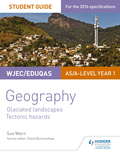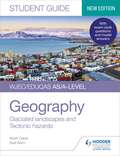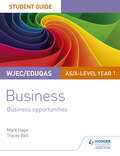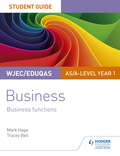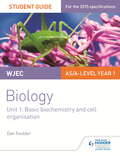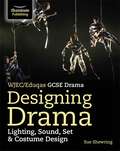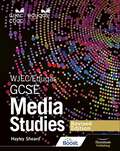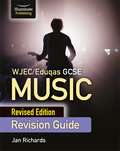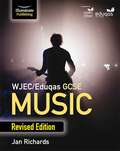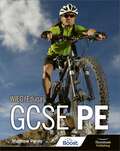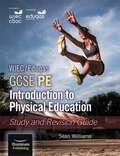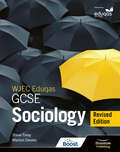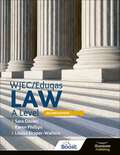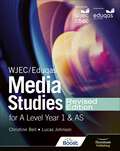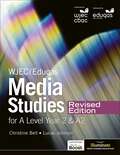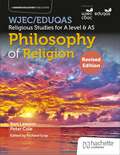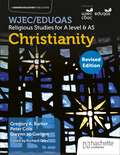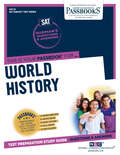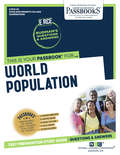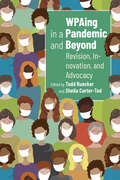- Table View
- List View
WJEC/Eduqas AS/A-level Geography Student Guide 3: Glaciated Landscapes; Tectonic Hazards
by Sue WarnReinforce students' geographical understanding throughout their course; clear topic summaries with sample questions and answers help students improve their exam technique and achieve their best.Written by a teacher with extensive examining experience, this guide:- Helps students identify what they need to know with a concise summary of the topics examined at AS and A-level- Consolidates understanding through assessment tips and knowledge-check questions- Offers opportunities for students to improve their exam technique by consulting sample graded answers to exam-style questions- Develops independent learning and research skills- Provides the content students need to produce their own revision notes
WJEC/Eduqas AS/A-level Geography Student Guide 3: Glaciated landscapes and Tectonic hazards
by Kevin Davis Sue WarnReinforce geographical understanding throughout the course with clear topic summaries and sample questions and answers to help your students target higher grades. Written by teachers with extensive examining experience and fully updated for 2020 by experienced teacher and author Kevin Davies, this Student Guide covers: - Eduqas A-level Component 1: Changing landscapes and changing places, Section A Glaciated landscapes- Eduqas A-level Component 3: Contemporary themes in geography, Section A Tectonic hazards - WJEC AS Unit 1 Changing landscapes, Section A Glaciated landscapes and Section B Tectonic hazards- WJEC A2 Unit 4 Contemporary themes in geography, Section A Tectonic hazards Our Student Guides are divided into two key sections Content Guidance and Questions and Answers.Content Guidance will help your students to: - Identify key content for the exams with our concise coverage of topics- Reinforce your learning with bullet-list summaries at the end of each section- Test your knowledge with rapid-fire knowledge check questions and answersQuestions and Answers will help your students to:- Build understanding of the different question types- Find out what examiners are looking for with sample answers and commentary explaining why marks have been awarded
WJEC/Eduqas AS/A-level Geography Student Guide 3: Glaciated landscapes and Tectonic hazards
by Kevin Davis Sue WarnReinforce geographical understanding throughout the course with clear topic summaries and sample questions and answers to help your students target higher grades. Written by teachers with extensive examining experience and fully updated for 2020 by experienced teacher and author Kevin Davies, this Student Guide covers: - Eduqas A-level Component 1: Changing landscapes and changing places, Section A Glaciated landscapes- Eduqas A-level Component 3: Contemporary themes in geography, Section A Tectonic hazards - WJEC AS Unit 1 Changing landscapes, Section A Glaciated landscapes and Section B Tectonic hazards- WJEC A2 Unit 4 Contemporary themes in geography, Section A Tectonic hazards Our Student Guides are divided into two key sections Content Guidance and Questions and Answers.Content Guidance will help your students to: - Identify key content for the exams with our concise coverage of topics- Reinforce your learning with bullet-list summaries at the end of each section- Test your knowledge with rapid-fire knowledge check questions & answersQuestions and Answers will help your students to:- Build understanding of the different question types- Find out what examiners are looking for with sample answers and commentary explaining why marks have been awarded
WJEC/Eduqas AS/A-level Year 1 Business Student Guide 1: Business Op Epub
by Mark Hage Tracey BellBuild, reinforce and assess students' knowledge throughout their course; tailored to the 2015 WJEC and WJEC Eduqas specifications and brought to you by the leading A-level Business publisher, these study and revision guides combine clear content coverage with practice questions and sample answers.- Ensure understanding with concise coverage of each topic, broken down into manageable chunks- Help students apply their knowledge to up-to-date examples that cover key content areas such as technology and globalisation- Consolidate understanding with exam tips and knowledge-check questions- Practise exam-style questions for every question type, with plenty of opportunities to develop the maths and quantitative skills that students need to succeed- Improve students' exam technique and show them how to reach the next grade using sample student answers and commentary for each exam-style question- Use flexibly in class or at home, for knowledge acquisition during the course or focused revision and exam preparation
WJEC/Eduqas AS/A-level Year 1 Business Student Guide 1: Business Opportunities
by Mark Hage Tracey BellExam boards: WJEC and WJEC EduqasLevel: AS/A-levelSubject: BusinessFirst teaching: September 2015First exams: Summer 2016 (AS); Summer 2017 (A-level)Build, reinforce and assess students' knowledge throughout the course. Tailored to the 2015 WJEC and Eduqas specifications and brought to you by the leading A-level Business publisher, this study and revision guide combines clear content coverage with practice questions and sample answers.- Ensure understanding with concise coverage of each topic, broken down into manageable chunks- Help students apply their knowledge to up-to-date examples that cover key content areas such as technology- Consolidate understanding with exam tips and knowledge-check questions- Practise exam-style questions for every question type, with plenty of opportunities to develop the maths and quantitative skills that students need to succeed- Improve students' exam technique and show them how to reach the next grade using sample student answers and commentary for each exam-style question- Use flexibly in class or at home, for knowledge acquisition during the course or focused revision and exam preparationThis Student Guide covers the content of:- 2015 WJEC AS/A-level Business specifications regulated by Qualifications Wales- 2015 WJEC Eduqas AS/A-level Business specifications regulated by Ofqual
WJEC/Eduqas AS/A-level Year 1 Business Student Guide 2: Bus Func Epub
by Mark Hage Tracey BellExam boards: WJEC and WJEC EduqasLevel: AS/A-levelSubject: BusinessFirst teaching: September 2015First exams: Summer 2016 (AS); Summer 2017 (A-level)Build, reinforce and assess students' knowledge throughout the course. Tailored to the 2015 WJEC and Eduqas specifications and brought to you by the leading A-level Business publisher, this study and revision guide combines clear content coverage with practice questions and sample answers.- Ensure understanding with concise coverage of each topic, broken down into manageable chunks- Help students apply their knowledge to up-to-date examples that cover key content areas such as technology- Consolidate understanding with exam tips and knowledge-check questions- Practise exam-style questions for every question type, with plenty of opportunities to develop the maths and quantitative skills that students need to succeed- Improve students' exam technique and show them how to reach the next grade using sample student answers and commentary for each exam-style question- Use flexibly in class or at home, for knowledge acquisition during the course or focused revision and exam preparationThis Student Guide covers the content of:- 2015 WJEC AS/A-level Business specifications regulated by Qualifications Wales- 2015 WJEC Eduqas AS/A-level Business specifications regulated by Ofqual
WJEC/Eduqas AS/A-level Year 1 Business Student Guide 2: Business Functions
by Mark Hage Tracey BellExam boards: WJEC and WJEC EduqasLevel: AS/A-levelSubject: BusinessFirst teaching: September 2015First exams: Summer 2016 (AS); Summer 2017 (A-level)Build, reinforce and assess students' knowledge throughout the course. Tailored to the 2015 WJEC and Eduqas specifications and brought to you by the leading A-level Business publisher, this study and revision guide combines clear content coverage with practice questions and sample answers.- Ensure understanding with concise coverage of each topic, broken down into manageable chunks- Help students apply their knowledge to up-to-date examples that cover key content areas such as technology- Consolidate understanding with exam tips and knowledge-check questions- Practise exam-style questions for every question type, with plenty of opportunities to develop the maths and quantitative skills that students need to succeed- Improve students' exam technique and show them how to reach the next grade using sample student answers and commentary for each exam-style question- Use flexibly in class or at home, for knowledge acquisition during the course or focused revision and exam preparationThis Student Guide covers the content of:- 2015 WJEC AS/A-level Business specifications regulated by Qualifications Wales- 2015 WJEC Eduqas AS/A-level Business specifications regulated by Ofqual
WJEC/Eduqas Biology AS/A Level Year 1 Student Guide: Basic biochemistry and cell organisation
by Dan FoulderExam Board: WJEC, EduqasLevel: AS/A-levelSubject: BiologyFirst Teaching: September 2015First Exam: June 2016Reinforce students' understanding throughout their course with clear topic summaries and sample questions and answers to help your students target higher grades.Written by experienced teacher Dan Foulder, our Student Guides are divided into two key sections, content guidance and sample questions and answers.Content guidance will:- Develop students' understanding of key concepts and terminology; this guide covers basic biochemistry and cell organisation.- Consolidate students' knowledge with 'knowledge check questions' at the end of each topic and answers in the back of the book.Sample questions and answers will:- Build students' understanding of the different question types, so they can approach each question with confidence.- Enable students to target top grades with sample answers and commentary explaining exactly why marks have been awarded.
WJEC/Eduqas GCSE Drama - Designing Drama: Lighting, Sound, Set And Costume Design
by Sue ShewringThe Student Book provides comprehensive support for the design route through the WJEC/Eduqas GCSE Drama specification, covering all lighting, sound, set and costume options // The clear and accessible layout will help you engage with and fully understand key design ideas and information. // Written by an experienced author and drama teacher in collaboration with expert consultants working professionally in each of the design areas. // Includes a variety of features including Assessment Checks, Tasks and Design Tips, with key terminology identified and defined throughout. // Numerous diagrams, sketches, plans and photographs help you visualise the practical elements of being a drama designer. // Provides a range of practice questions with exemplar answers and extensive advice on exam preparation.
WJEC/Eduqas GCSE Media Studies Student Book – Revised Edition
by Hayley SheardThe popular WJEC/Eduqas GCSE Media Studies Student Book has been revised and updated to reflect the latest amendments to the specifications. It covers the new set products for assessment from 2021 and includes the new set products added for assessment in 2024.Endorsed by WJEC/Eduqas, this accessible and engaging resource will support students through their GCSE Media Studies course.The Revised Edition provides:- New examples of contemporary media products across a range of forms.- Updated sections on media contexts to reflect recent developments in culture and society.- Up-to-date statistics and information about media industries and audiences.- New activities to reinforce students' knowledge and understanding.- Up-to-date information about the exam components including practice questions to help students with the skills they need for assessment.- Highly visual and engaging design.- Detailed coverage of all areas of the specification, supported by highly illustrated examples.- Exploration of the theoretical framework of Media Studies, applied to a range of media forms and products.- A dedicated chapter on the Non-Exam Assessment element of the specification providing clear guidance on how students will be assessed.- Exam guidance chapter to introduce students to practice questions and the assessment objectives.- A variety of activities and extension tasks to help students broaden their knowledge and understanding and encourage independent learning.
WJEC/Eduqas GCSE Music Revision Guide - Revised Edition
by Jan RichardsThe Revised Edition covers the WJEC/Eduqas amended GCSE Music specifications for first teaching from September 2020. // This revised edition covers the new prepared extracts in Unit 3 (WJEC) and Component 3 (Eduqas) for assessment from summer 2022: WJEC: Peer Gynt Suite No.1: Anitra's Dance: Grieg, Everything Must Go: Manic Street Preachers // Eduqas: Badinerie by J.S.Bach for Flute and String Orchestra with Harpsichord, Africa: Toto // This practical and concise revision guide is designed to support students preparing for their WJEC and Eduqas GCSE Music assessment. // Provides the necessary musical information in a succinct and accessible format, ensuring students are fully equipped for assessment // Offers students the opportunity to practise identifying the elements of music when listening, and how they are used in composing // Highlights the required Musical Terms with definitions and includes plenty of Practice Questions to assist students in developing their musical theory skills // Provides help and advice on how to approach the listening examination and coursework // Contains Sample Exam Questions with example answers and commentaries to demonstrate ways to approach the exam aspect of the course // Free audio clips and web links to music to accompany this book will be provided via a dedicated website. 'Listening' icons alongside relevant sections within the book indicate when to go online.
WJEC/Eduqas GCSE Music Student Book: Revised Edition
by Jan RichardsThe Revised Edition of this popular Student Book covers the WJEC/Eduqas amended GCSE Music specifications for first teaching from September 2020. // This revised edition covers the new prepared extracts in Unit 3 (WJEC) and Component 3 (Eduqas) for assessment from summer 2022: WJEC, Peer Gynt Suite No.1: Anitra's Dance: Grieg, Everything Must Go: Manic Street Preachers, Eduqas, Badinerie by J.S.Bach for Flute and String Orchestra with Harpsichord Africa: Toto // Endorsed by WJEC // Covers all four Areas of Study: Musical Forms and Devices, Music for Ensemble, Film Music and Popular Music // Provides practical activities, extension tasks, suggestions for additional listening and useful tips for individual and group work // Supports students in all aspects of Performing, Composing and Appraising // Helps students prepare for the Performing Assessment and presentation of their coursework for Composing: includes identifying best practice, practical advice and guidance on how to complete the required log, evaluation and programme notes // Free audio clips and web links to music performances to accompany this book are provided via a dedicated website. 'Listen online' icons alongside relevant sections within the book indicate when to go online.
WJEC/Eduqas GCSE PE
by Matthew PennyWritten by experienced author, teacher and examiner Matthew Penny, this comprehensive and colourful Student Book is designed to fully support both WJEC and Eduqas students throughout their GCSE PE course.- Covers the core components of the specification - Health, training & exercise, Exercise physiology, Movement analysis, Psychology of sport & physical activity and Socio-cultural issues in physical activity & sport.- Each chapter is built around a central 'Big Question' which enables students to learn the subject content within a practical sporting context.- Step-by-step approach allows students to gradually add more subject knowledge and skills throughout each chapter and equips them to fully answer the exam-style question at the end.- Separate 'Topic Tests' check knowledge and understanding, and help students understand how exam questions are worded, enabling them to build an answer that tackles the required Assessment Objectives.- Separate 'Practical Investigations' provide plenty of hands-on activities that bring difficult concepts and theories to life and help students personalise their learning.- Detailed and colourful visual approach make it accessible and easy-to-follow.
WJEC/Eduqas GCSE PE: Study And Revision Guide
by Sean WilliamsSo much more than a traditional revision resource, this Study and Revision Guide has been carefully designed to give students clear guidance on every aspect of the GCSE course and prepare them thoroughly for their final exams. // Written by an experienced teacher and examiner and endorsed by WJEC, it provides high quality support you can trust. // The innovative design allows the content of each topic to be covered in a three-step sequence: knowledge and understanding (AO1) pages begin each topic, followed by (AO2) application of knowledge and then (AO3) analysis & evaluation. // Comprehensive support for Unit 1 / Component 1 Introduction to Physical Education. // Clear and succinct presentation of the key information needed per topic, ensuring students are fully equipped for assessment. // Provides a clear focus on the assessment needs for exam success. // Recap and summaries per topic present information in diagrammatic and visual styles to aid the revision process.
WJEC/Eduqas GCSE Sociology – Student Book - Revised Edition
by Marion Davies Steve TiveyThe WJEC Eduqas GCSE Sociology Student Book has been revised and updated to reflect the latest social changes and is endorsed by WJEC Eduqas. With new real-life examples and updated statistics, along with revised coverage of exam components, this accessible and engaging resource will support students through their GCSE Sociology course.What's new in the Revised Edition?- New updated real-life examples of sociological ideas to help with understanding and for students to apply in the exam.- Updated sections including new social contexts to reflect recent developments in culture and society.- Up-to-date statistics and information to help students evaluate sociological theories, equality/inequality.- Up-to-date information about the exam components including new practice questions and completely new model answers to help students with the skills they need for assessment.What have we retained?- A simple and straightforward double-page-spread layout for easy navigation around the topics.- A range of activities to help students to think sociologically, including `Take it Further' and `Think Theory'.- A dedicated Sociological enquiry and research methods chapter which introduces students to one of the key areas of study in Sociology.- Exam practice chapter provides students with advice and guidance on how to revise and refine their exam technique, helping them thoroughly prepare for the exams.- A variety of features throughout the book challenges learners to think for themselves and help develop their understanding of the topics.
WJEC/Eduqas Law A Level: Second Edition
by Sara Davies Karen Phillips Louisa Draper-WaltersWritten by experienced Law teachers and examiners, this comprehensive student book has been revised and updated to reflect the latest changes in the law. With up-to-date case examples, extensive exam support and a variety of useful features, it offers high quality support for the WJEC and Eduqas A Level Law courses.- Designed for both the WJEC and Eduqas specifications, each topic is mapped to the relevant specifications for quick reference and easy navigation.- Covers all the content of the AS and A Level courses in a single student-friendly book.- Includes comprehensive exam support, with updated exam questions supported by detailed guidance and answers available online.- A variety of features, including Grade Boost, Key Cases and Stretch and Challenge activities encourage students to think critically and help develop their knowledge and understanding and ability to analyse.- An Exam practice and technique section provides advice and guidance on how to revise and helps develop the skills needed for the exams.
WJEC/Eduqas Media Studies For A Level Year 1 and AS Student Book – Revised Edition
by Christine Bell Lucas JohnsonThe WJEC/Eduqas Media Studies for A Level Year 1 & AS Student Book has been revised and updated to reflect the latest amendments to the specification. This accessible and engaging resource will support students through their A Level Media Studies course.- Endorsed by WJEC/Eduqas it offers high quality support you can trust.- Covers the new set products for assessment from 2024 onwards.- Includes new examples of contemporary media products across a range of forms with updated sections on media contexts to reflect recent developments in culture and society.- Up-to-date statistics and information about media industries and audiences.- New activities to reinforce students' knowledge and understanding.- Up-to-date information about the exam components including practice questions to help students with the skills they need for assessment.
WJEC/Eduqas Media Studies For A Level Year 2 Student Book – Revised Edition
by Christine Bell Lucas JohnsonThe WJEC/Eduqas Media Studies for A Level Year 2 & A2 Student Book has been revised and updated to reflect the latest amendments to the specification. This accessible and engaging resource will support students through their A Level Media Studies course.- Endorsed by WJEC/Eduqas it offers high quality support you can trust.- Covers the new set products for assessment from 2024 onwards.- Includes new examples of contemporary media products across a range of forms with updated sections on media contexts to reflect recent developments in culture and society.- Up-to-date statistics and information about media industries and audiences.- New activities to reinforce students' knowledge and understanding.- Up-to-date information about the exam components including practice questions to help students with the skills they need for assessment.
WJEC/Eduqas Religious Studies for A Level & AS - Philosophy of Religion Revised
by Richard Gray Karl LawsonOur popular Philosophy of Religion student book has been completely revised and updated to provide a single book for AS and A-level. Written by a team of experienced teachers and authors with an in-depth understanding of teaching, learning and assessment at AS and A-level, this accessible and engaging student book will support your students throughout the course and help them prepare for the exams. - Submitted for endorsement to WJEC/Eduqas to ensure high quality support you can trust- Updated to provide improved mapping to the specifications with focused content and support in a single book for A Level and AS, offering excellent value for money- Accessible language and appealing layout help your students more easily engage with the information and get the most out of the course- Provides a skill-based approach to learning, which combines content of the course and exam preparation throughout, helping students to develop important exam skills right from the start- Key terms and ideas are clearly identified and defined throughout- Regular exam practice questions with advice and exemplar answers help students prepare for the exams
WJEC/Eduqas Religious Studies for A Level & AS - Philosophy of Religion Revised
by Richard Gray Karl LawsonOur popular Philosophy of Religion student book has been completely revised and updated to provide a single book for AS and A-level. Written by a team of experienced teachers and authors with an in-depth understanding of teaching, learning and assessment at AS and A-level, this accessible and engaging student book will support your students throughout the course and help them prepare for the exams. - Submitted for endorsement to WJEC/Eduqas to ensure high quality support you can trust- Updated to provide improved mapping to the specifications with focused content and support in a single book for A Level and AS, offering excellent value for money- Accessible language and appealing layout help your students more easily engage with the information and get the most out of the course- Provides a skill-based approach to learning, which combines content of the course and exam preparation throughout, helping students to develop important exam skills right from the start- Key terms and ideas are clearly identified and defined throughout- Regular exam practice questions with advice and exemplar answers help students prepare for the exams
WJEC/Eduqas Religious Studies for A Level & AS -Christianity Revised
by Peter Cole Gwynn Ap Gwilym Gregory BarkerOur popular Christianity student book has been completely revised and updated to provide a single book for AS and A-level.Written by a team of experienced teachers and authors with an in-depth understanding of teaching, learning and assessment at AS and A-level, this accessible and engaging student book will support your students throughout the course and help them prepare for the exams.- Submitted for endorsement to WJEC/Eduqas to ensure high quality support you can trust- Updated to provide improved mapping to the specifications with focused content and support in a single book for A Level and AS, offering excellent value for money- Accessible language and appealing layout help your students more easily engage with the information and get the most out of the course- Provides a skill-based approach to learning, which combines content of the course and exam preparation throughout, helping students to develop important exam skills right from the start- Key terms and ideas are clearly identified and defined throughout- Regular exam practice questions with advice and exemplar answers help students prepare for the exams
WJEC/Eduqas Religious Studies for A Level & AS -Christianity Revised
by Peter Cole Gwynn Ap Gwilym Gregory BarkerOur popular Christianity student book has been completely revised and updated to provide a single book for AS and A-level.Written by a team of experienced teachers and authors with an in-depth understanding of teaching, learning and assessment at AS and A-level, this accessible and engaging student book will support your students throughout the course and help them prepare for the exams.- Submitted for endorsement to WJEC/Eduqas to ensure high quality support you can trust- Updated to provide improved mapping to the specifications with focused content and support in a single book for A Level and AS, offering excellent value for money- Accessible language and appealing layout help your students more easily engage with the information and get the most out of the course- Provides a skill-based approach to learning, which combines content of the course and exam preparation throughout, helping students to develop important exam skills right from the start- Key terms and ideas are clearly identified and defined throughout- Regular exam practice questions with advice and exemplar answers help students prepare for the exams
WORLD HISTORY: Passbooks Study Guide (College Board SAT Subject Test Series #F No. 33)
by National Learning CorporationSAT Subject Tests, developed by the College Board, are required by many colleges and universities as part of their admission requirements. The SAT World History Passbook® prepares you for your test by allowing you to take practice exams modeled after the real SAT Subject Test. It provides hundreds of questions and answers that require knowledge of world history in all fields, from political and diplomatic to cultural and economic. These questions are similar to the ones you will find on your upcoming exam, including but not limited to: political history; economics; religion; military history; literature; and interpretation of maps, graphs and political cartoons.
WORLD POPULATION: Passbooks Study Guide (Excelsior/Regents College Examination Series #Pep-63)
by National Learning CorporationThe Excelsior/Regents College Examinations (E/RCE) offer you an opportunity to obtain recognition for college-level learning and consists of exams designed to demonstrate achievement and mastery of various college-level subjects, such as the Arts and Sciences, Business, Criminal Justice, Education, Health and Nursing. The E/RCE World Population Passbook® prepares you by sharpening knowledge of the skills and concepts necessary to succeed on the upcoming exam and the college courses that follow. It provides a series of informational texts as well as hundreds of questions and answers in the areas that will likely be covered on your upcoming exam.
WPAing in a Pandemic and Beyond: Revision, Innovation, and Advocacy
by Todd Ruecker Sheila Carter-TodWriting program administrators have a long history of advocating for their students, fellow faculty, and programs. This advocacy includes defending their work against other entities that seek to dictate the work, challenging institutional policies that define student success in a narrow way or create untenable conditions for writing faculty workloads, and making antiracism a central part of writing programs. The COVID-19 pandemic undoubtedly created a variety of additional challenges for those working in education at all levels. WPAs suddenly had to navigate new public health mandates alongside student and instructor fears as well as pressures by administrations and publics to teach in person. The chapters in this collection include a variety of voices who have been involved in writing program administration in recent years to reflect on the work done in this moment of crisis. Through both short vignettes and longer chapters, this book explores the complicated interactions between WPA work and navigating times of crisis to provide insights for moving forward. Authors explore a variety of topics including professional development, curricular change, advocating in the face of intransigent administrations and others, caring for students, and taking time for self-care. Pointing to specific actions for continued advocacy, WPAing in a Pandemic and Beyond will be of great interest to WPAs and writing studies scholars.
